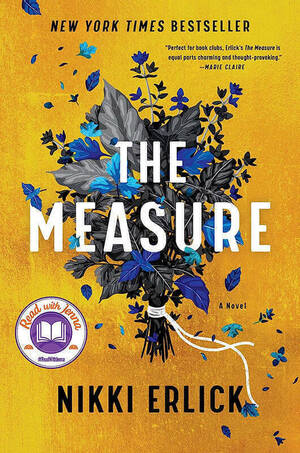Death has been prowling around me for a while now. Over the last year, my best friend of 55 years has undergone three surgeries and 11 rounds of chemotherapy for cancer. Seven months ago, my sister-in-law dropped dead one week before her 61st birthday. Her sister’s breast cancer has now invaded her bones to the point where walking is difficult. Last month, my mother-in-law had emergency surgery. I spent a grueling four days sitting beside my father-in-law in the intensive care unit as she made clear that she does not want the surgery needed to prolong her life beyond the next few months, or any other lifesaving procedure. Oh, and my husband has cancer, too, but it’s the kind you can live with for decades.

Amid all this, but before my mother-in-law’s surgery, my Notre Dame roommate suggested I read Nikki Erlick’s debut novel, The Measure. The story begins early one morning when everyone in the world who is 22 or older finds a small box inscribed with “the measure of your life lies within” at their doorstep. Inside each box is an indestructible string. Some strings are long, some short, but they all foretell the exact length of the recipient’s life. Now everyone knows when he or she will die.
Erlick uses the interweaving tales of her characters’ lives to explore the effects of this profound cultural change from the most intimate and personal levels to the global. “Short-stringers,” as people who will die young are soon called, face immediate prejudice. Their partners leave them because they fear future heartbreak. Those “long-stringers” who remain faithful to their loves are hailed as heroes.
The military removes short-stringers from combat positions. Banks refuse them loans. Colleges refuse them scholarships. An American presidential candidate runs a campaign based on fearmongering against short-stringers.
Some people fight back against the injustice. They argue that we are all human, that short-stringers deserve the right to make their contributions in the time they have. They attend rallies and join global movements. Individually, some choose to marry and have children despite knowing how short one partner’s life will be. But it’s easier to sow fear and institutionalize prejudice than it is to roll it back.
You could read The Measure as a brilliant political fable, especially regarding the power fear holds in American culture today. Or you could read it as an explanation of the construction and mechanisms of prejudice. You could understand it as a meditation on love and its risks. Or you could read it as a memento mori reminding us that we do not know when we will die.
My roommate read the book as an exploration of the human condition. (We majored in the Program of Liberal Studies.) We agreed that not knowing how much time you or the people you love have on this earth is a fundamental aspect of being human. But we couldn’t decide whether we would open our own boxes. If we could know when — but not how — we will die, would we want to?
Neither of my sons has reached his 22nd birthday. I would urge them not to open their boxes. Not to find out how long their life will be, but rather to live it as fully as possible each day they are alive. As a family, we’re very aware that we don’t know how long we have with anyone. Reading The Measure helped me reach my own conclusion: We had better love generously now, while we can.
Megan Koreman lives in Royal Oak, Michigan. She is a historian and author of The Expectation of Justice: France, 1944-1946 and The Escape Line: How the Ordinary Heroes of Dutch-Paris Resisted the Nazi Occupation of Western Europe. A young adult novel, Dark Clouds over Paris, is forthcoming. Read more at dutchparisblog.com.